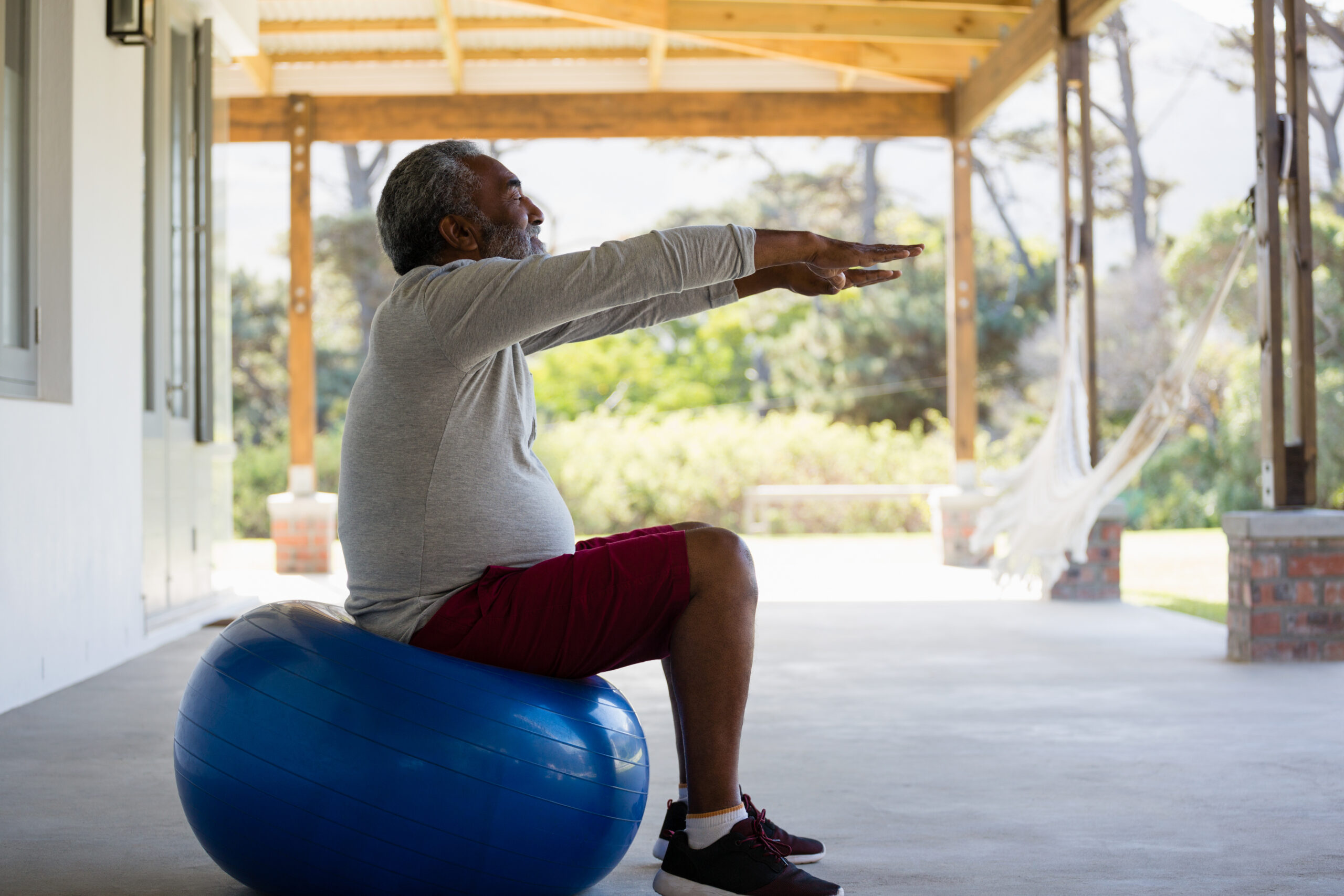Tips to Promote Independence for Seniors

As seniors age, a common concern is losing their independence. It’s no surprise that aging poses new challenges regarding one’s health and ability to do things on their own safely. Let’s take a look at several lifestyle tips for promoting independence for seniors.
How Can Seniors Take Control of Their Lives?
Create a Daily or Weekly Schedule
When people get older, they may feel like they no longer have a purpose. Common reasons include their children growing up and moving out, they retired from work, and/or they lost a spouse. To help them have a reason for getting up each morning, it’s a great idea to create a daily or weekly schedule. This can include eating breakfast, reading the mail, going for a walk, or even calling a close friend.
Make Time for Your Mental Health and Socializing with Others
Older adults may find that they have more doctor appointments to go to, which is necessary for staying healthy. While these appointments are important, remember to make time for your mental health. Everyone needs time to relax, spend time with friends, and do something they enjoy. Fun hobbies may include reading a favorite book, gardening, or learning a new recipe.
Make Decisions About Your Future
It’s never too late to make important plans about your future. You can meet with a financial planner or lawyer, who can help guide you on these life decisions. As you plan on your future, consider the following factors:
- The type of healthcare you would like to receive
- Choosing your power of attorney
- Choosing your health care proxy
- Choosing the types of home care and assistance you would like to receive if needed
Keep in mind that doing this will also significantly reduce the stress and pressure on your loved one’s that would be in charge of making these important healthcare decisions if you hadn’t planned it out already.
Safety Proofing Your Home
To maintain your independence for as long as possible, it’s important to create a safer home environment. This involves minor changes to your home that will make it safer to get around on your own. For example, you may consider installing non-slip floors, handrails, and using a shower bench in your bathroom. To make it easier to see at night, make sure to use nightlights in the hallways and bathrooms. You may also want to consider wearing a safety alarm, which is a nice safety net if you were to fall down.
As you continue to age, you may find that living on your own is no longer the safest option. That doesn’t mean you have lost your independence though. You can move into a senior community home where you can still live at home, but receive assistance with housekeeping duties.
Find Ways to Relax
It can be stressful at any age, which includes older adults too. It’s important to find effective, safe ways to help you relax. For many seniors, they find that meditation and practicing mindfulness are excellent ways to reduce their anxiety, depression, and overall stress. With less stress, it’s much easier to maintain one’s independence.
Don’t Let Your Age Define Your Life
When you stay active, you are less likely to feel your actual age. This includes spending time with friends, exercising, making decisions about their lives, and practicing mindfulness. Feeling younger is a great benefit because it will help you maintain your mental and physical health.
Exercise On a Regular Basis
It’s recommended that you talk with your primary care doctor to determine if you are healthy enough for regular exercise. If you are, ask them for specific suggestions for how you can stay fit. By exercising on a daily basis, it will be easier to maintain your balance, mobility, and weight. You will also reduce your risks of falls, which is a main reason that causes seniors to lose their independence.
Connect with Friends
While family and caregivers play a key role in helping you stay healthy and maintain your independence, it’s essential that you make time to connect with friends. By socializing, it will help keep your brain healthy and help reduce your risk of mental illnesses later on. Who knew spending time with others was so important?
Find New Hobbies
Aging can lead to new challenges regarding what you do for fun. If you can no longer participate in certain hobbies, this is a great opportunity to find a new hobby. This will help give you a purpose and likely lead to making new friends!
We hope you enjoyed this week’s article about tips for promoting seniors’ independence. It’s never easy getting older, but you can still enjoy life and maintain your independence for as long as possible. By using these lifestyle tips, you can take the steps to maintain your long-term health and wellness too. Contact Liberty HomeCare and Hospice Services today to learn how we can help you achieve your independence through our home care services.
Why a Family Support System is Important for the Elderly

As people age, having a family support system is crucial for the elderly. A support system provides a social network, helps improve their loved one’s health, and can even extend their life compared to older adults without any friends or family. Let’s take a look at why a family support system is beneficial for the elderly.
A Direct Connection Between Family and Health
A United States Aging Survey found that 30 percent of seniors believe staying connected to family and friends is a main concern. The survey found that most seniors believe that maintaining relationships with family and friends is more important than having financial support. Aside from older adults’ views, studies have shown a direct connection between an older adult’s health and their relationship with family. Indeed, family is important for the elderly’s mental, physical, and social health.
What Are the Benefits of a Family Support System for the Elderly?
1. Longer Life Expectancy
When older adults maintain social connections with their family members, this can increase their life expectancy compared to those that are socially isolated. It may not be an obvious benefit, but a family’s presence can improve their overall health in their remaining years. This is also true for those with dementia.
2. Stronger Immune System
Older adults that have a family support system and regularly connect with others typically have stronger immune systems. This is a major benefit, especially since older adults tend to have weaker immune systems as they age. In turn, a healthier immune system will be better equipped to fight off illnesses that older adults come in contact with.
3. Better Mental Health
Another benefit for seniors that stay close with family is having improved mental health compared to those that aren’t close to loved ones. It’s important for older adults to socialize with their family and to be reminded that they are loved and valued. This can help seniors be less likely to suffer from mental illnesses like depression.
4. Better Brain Health
Older adults who stay socially connected also benefit from having higher levels of cognitive function. Studies have shown that those that enjoyed participating in social activities were more likely to have better memory and thinking skills. On the other hand, older adults that did not enjoy socializing experienced a decrease in their cognitive health.
5. A Family Support System
Like any family, the type of support and interactions change overtime. A parent that once supported and took care of their child will eventually have the roles reversed as the adult child cares for and supports the aging parent. This is a normal part of life.
For many aging parents, financial support is necessary to receive the medical care required as they age. When their family is able to offer this support, this can melt away some of the stress that an older adult may feel. This is important, especially when stress can weaken an older adult's already weakened immune system.
Additionally, emotional support is another major benefit of having a support system. It helps to have someone to talk to and listen to them about their good and bad days. This shows them that their family cares, which can have a positive impact on their outlook on life.
Another type of support is to help older adults perform daily activities, such as cleaning their house, going shopping, or even cooking. If an older adult has a bigger family, the family can take turns helping the older adult out. These simple acts can make a big difference in helping seniors not feel alone.
6. Friendships Are Important Too
Since not every older adult has family near them, they can still benefit from social connections and support from old and new friends. Studies have shown that having strong social connections has a positive benefit to seniors’ health, whether that is with friends or family.
If an older adult wants to make new friends, there are quite a few tips to achieve this great goal. Older adults can visit their local pool, volunteer at a local organization, take a community class for seniors, or join a gym. There are plenty of options to discover new friendships and stay connected with others.
We hope this article was helpful, especially if you have an older adult in your life. A family support system isn’t just beneficial, it’s crucial for the elderly’s mental, physical, and emotional health and well-being. For those that do not have nearby family, a close group of friends can still provide the same benefits. Contact Liberty HomeCare and Hospice Services today to learn more about our home care, hospice care, and palliative care designed to help your loved one’s achieve their highest quality of life in the place they love - their homes.
Top 10 Tips for a Healthy Lifestyle

The U.S. Census Bureau reports that there are 76.4 million baby boomers in the United States. This group refers to Americans born from 1946 to 1964. Thanks to progress made in the medical field, more older adults are living longer. Since healthy living has countless benefits for older adults, it’s helpful to know some tips to adopt a healthier life. If you’re interested in learning how to live a higher quality of life, keep reading below.
1. Stop Smoking
If you are a smoker, this is the perfect time to quit for good. By quitting this addiction, you can reduce your risk for aging, cancer, heart failure, and strokes. Indeed, this will help improve your health and well-being. For men, smoking can cause erectile dysfunction as a result of atherosclerosis. It’s recommended to talk with your doctor about the best options to quit smoking. There are several options to quit, including medicine, nicotine patches and gum, and therapy.
2. Stay Active
On a daily basis, it’s important to exercise for at least 30 minutes. There are countless exercise ideas to help you maintain your balance, flexibility, and strength, as well as promote your cardiovascular health. By exercising, you will find it easier to maintain a healthy weight and improve your health and ability to sleep. Staying active will keep your body strong, which will help reduce your risk for falls. Exercising can also help you better manage stress, which will help you maintain your mental health.
3. Eat Healthy
Eating healthy is another way to promote a healthy lifestyle. The key is to eat a balanced diet on a consistent basis. A balanced diet consists of fresh fruits and vegetables, lean meats, whole grains, and healthy fats. Like any diet, it’s important to eat the correct portions for your size, age, and health. By eating healthy and exercising, you can help prevent several illnesses, including heart disease, high blood pressure, osteoporosis, and type 2 diabetes. For women, you can prevent osteoporosis by taking calcium and vitamin D supplements.
4. Maintain a Healthy Weight
Did you know that being overweight can increase your chance of getting diabetes, heart disease, and high blood pressure? You can maintain a healthier weight by eating healthy and exercising on a regular basis. To determine your ideal weight based on your height, use the Kaiser Permanente BMI (body mass index) calculator. To cut back on excess calories, it’s a good idea to replace sugary drinks with water, which is zero calories.
5. Reduce Your Fall Risks
Older adults can reduce their risk for falling by following some easy tips. This includes removing clutter and loose rugs from the home, using night lights in the hallways and bathrooms, keeping electrical cords stored away, and installing rails in bathrooms and staircases. Instead of walking barefoot, it’s better to wear supportive shoes that can better grip the flooring inside the home.
6. Stay Up-to-Date on Immunizations and Doctor Appointments
For older adults, it is vital that they go to their yearly checkups at their local doctor’s office. This is a key tip to maintain a healthy lifestyle, as well as monitor for any potential health risks. At age 50, women should receive mammography screenings to check for breast cancer. Men should also be checked for prostate cancer. These are just a couple of the dozens of preventative screenings that older adults can receive to check for various health risks.
As for immunizations, this is yet another important step that older adults can take to prevent serious health illnesses, such as shingles and the seasonal flu. For those that qualify, Medicare provides annual wellness visits, preventative screenings, and vaccinations to ensure that older patients can maintain their health.
7. Prevent Skin Cancer
During the aging process, skin becomes thinner and less elastic, as well as more dry and fragile. When older adults get injured, it takes longer for their cuts and bruises to fully heal. To help prevent skin cancer, it’s recommended that older adults wear SPF 30 or above sunscreen and limit their sun exposure. This will help reduce their exposure to ultraviolet rays that cause skin cancer, as well as reduce the appearance of wrinkles.
8. Receive Regular Checkups from Your Audiologist, Dentist, and Optometrist
Hearing loss is a common concern for people as they age. This is especially true for anyone that was exposed to extremely loud noises from work or an accident. By visiting an audiologist, an older adult can get their hearing checked. If they need a hearing aid, this can ensure that a person can hear properly. As you can imagine, being able to hear is very important - to hear people talking to you, your surroundings, and talk at an appropriate noise level for others to hear you (not whispering or screaming).
Believe it or not, an older adult can still maintain good oral health if they take care of their teeth. This includes brushing their teeth, flossing, eating healthy, drinking water, and visiting their dentist every 6 months for a cleaning appointment.
As for vision, most adults start noticing that their vision begins to change around age 50. This may include a gradual decline in their ability to see small text or focus on objects up close. Common vision issues include cataracts and glaucoma, which an optometrist can check for at yearly vision appointments.
9. Reduce Your Stress Levels
To reduce stress levels, there are various techniques to try until you find something that works. Popular stress-busting ideas include drawing, exercising, gardening, listening to music, meditation, praying, reading, socializing with others, and writing. Once you find something that melts away the stress, you will find that it also helps improve your physical and mental health, as well as how you feel about yourself. Positive thinking is a great approach to improve your outlook on life.
10. Do What You Love
As you age, you may find it challenging to do the things you used to love to do. However, you can still engage in fun activities that bring you joy and fulfillment in life. This will vary based on each person’s preferences and interests. Check out these fun ideas below for some inspiration to live each day fully.
- Learn a new song
- Get a pet
- Go golfing
- Join a community group (i.e. exercise, gardening, golfing, etc.)
- Read a new book series
- Start a mini garden
- Visit a friend or family member
- Write poetry
As you can see, there are several ways to adopt a healthier lifestyle. People are living longer than previous generations thanks to our advanced medicine and technology. We hope these 10 tips will help inspire you to take an active role in your health and achieve the highest quality of life possible. At Liberty HomeCare and Hospice Services, we are dedicated to helping you make each day matter with our compassionate, expert care. Our professional team offers a wide range of services, including home care, hospice care, and palliative care. Call us at 800-999-9883 to find out about our referrals and admissions.



